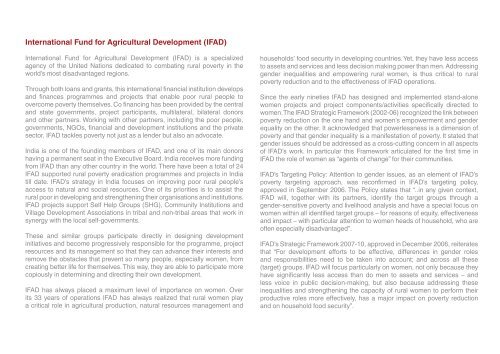Trail Blazers - IFAD
Trail Blazers - IFAD
Trail Blazers - IFAD
Create successful ePaper yourself
Turn your PDF publications into a flip-book with our unique Google optimized e-Paper software.
International Fund for Agricultural Development (<strong>IFAD</strong>)<br />
International Fund for Agricultural Development (<strong>IFAD</strong>) is a specialized<br />
agency of the United Nations dedicated to combating rural poverty in the<br />
world’s most disadvantaged regions.<br />
Through both loans and grants, this international financial institution develops<br />
and finances programmes and projects that enable poor rural people to<br />
overcome poverty themselves. Co financing has been provided by the central<br />
and state governments, project participants, multilateral, bilateral donors<br />
and other partners. Working with other partners, including the poor people,<br />
governments, NGOs, financial and development institutions and the private<br />
sector, <strong>IFAD</strong> tackles poverty not just as a lender but also an advocate.<br />
India is one of the founding members of <strong>IFAD</strong>, and one of its main donors<br />
having a permanent seat in the Executive Board. India receives more funding<br />
from <strong>IFAD</strong> than any other country in the world. There have been a total of 24<br />
<strong>IFAD</strong> supported rural poverty eradication programmes and projects in India<br />
till date. <strong>IFAD</strong>’s strategy in India focuses on improving poor rural people’s<br />
access to natural and social resources. One of its priorities is to assist the<br />
rural poor in developing and strengthening their organisations and institutions.<br />
<strong>IFAD</strong> projects support Self Help Groups (SHG), Community Institutions and<br />
Village Development Associations in tribal and non-tribal areas that work in<br />
synergy with the local self-governments.<br />
These and similar groups participate directly in designing development<br />
initiatives and become progressively responsible for the programme, project<br />
resources and its management so that they can advance their interests and<br />
remove the obstacles that prevent so many people, especially women, from<br />
creating better life for themselves. This way, they are able to participate more<br />
copiously in determining and directing their own development.<br />
<strong>IFAD</strong> has always placed a maximum level of importance on women. Over<br />
its 33 years of operations <strong>IFAD</strong> has always realized that rural women play<br />
a critical role in agricultural production, natural resources management and<br />
households’ food security in developing countries. Yet, they have less access<br />
to assets and services and less decision making power than men. Addressing<br />
gender inequalities and empowering rural women, is thus critical to rural<br />
poverty reduction and to the effectiveness of <strong>IFAD</strong> operations.<br />
Since the early nineties <strong>IFAD</strong> has designed and implemented stand-alone<br />
women projects and project components/activities specifically directed to<br />
women. The <strong>IFAD</strong> Strategic Framework (2002-06) recognized the link between<br />
poverty reduction on the one hand and women’s empowerment and gender<br />
equality on the other. It acknowledged that powerlessness is a dimension of<br />
poverty and that gender inequality is a manifestation of poverty. It stated that<br />
gender issues should be addressed as a cross-cutting concern in all aspects<br />
of <strong>IFAD</strong>’s work. In particular this Framework articulated for the first time in<br />
<strong>IFAD</strong> the role of women as “agents of change” for their communities.<br />
<strong>IFAD</strong>’s Targeting Policy: Attention to gender issues, as an element of <strong>IFAD</strong>’s<br />
poverty targeting approach, was reconfirmed in <strong>IFAD</strong>’s targeting policy,<br />
approved in September 2006. The Policy states that “..in any given context,<br />
<strong>IFAD</strong> will, together with its partners, identify the target groups through a<br />
gender-sensitive poverty and livelihood analysis and have a special focus on<br />
women within all identified target groups – for reasons of equity, effectiveness<br />
and impact – with particular attention to women heads of household, who are<br />
often especially disadvantaged”.<br />
<strong>IFAD</strong>’s Strategic Framework 2007-10, approved in December 2006, reiterates<br />
that “For development efforts to be effective, differences in gender roles<br />
and responsibilities need to be taken into account; and across all these<br />
(target) groups. <strong>IFAD</strong> will focus particularly on women, not only because they<br />
have significantly less access than do men to assets and services – and<br />
less voice in public decision-making, but also because addressing these<br />
inequalities and strengthening the capacity of rural women to perform their<br />
productive roles more effectively, has a major impact on poverty reduction<br />
and on household food security”.

















